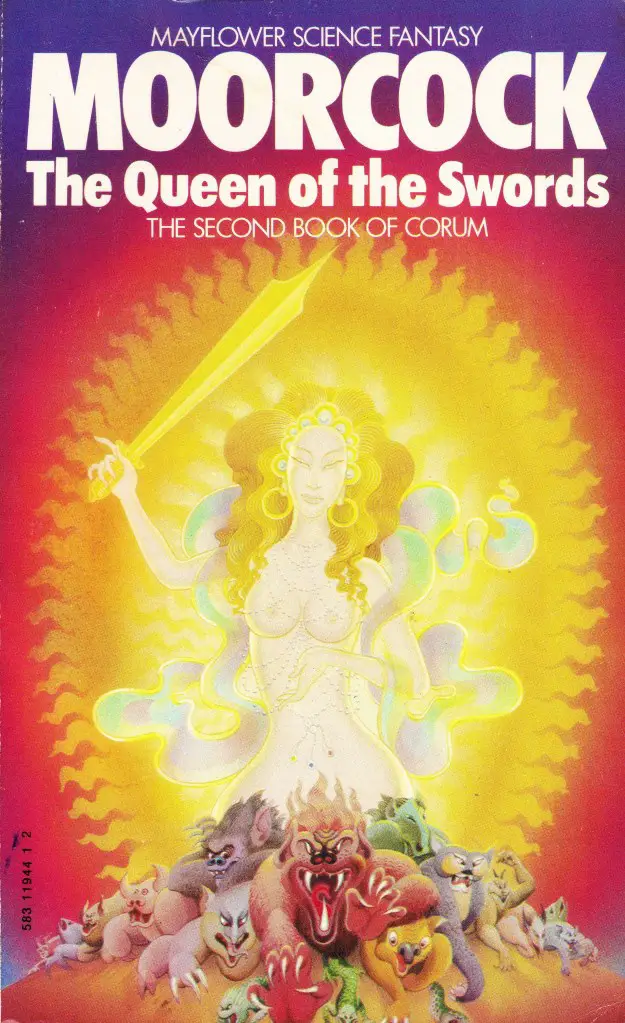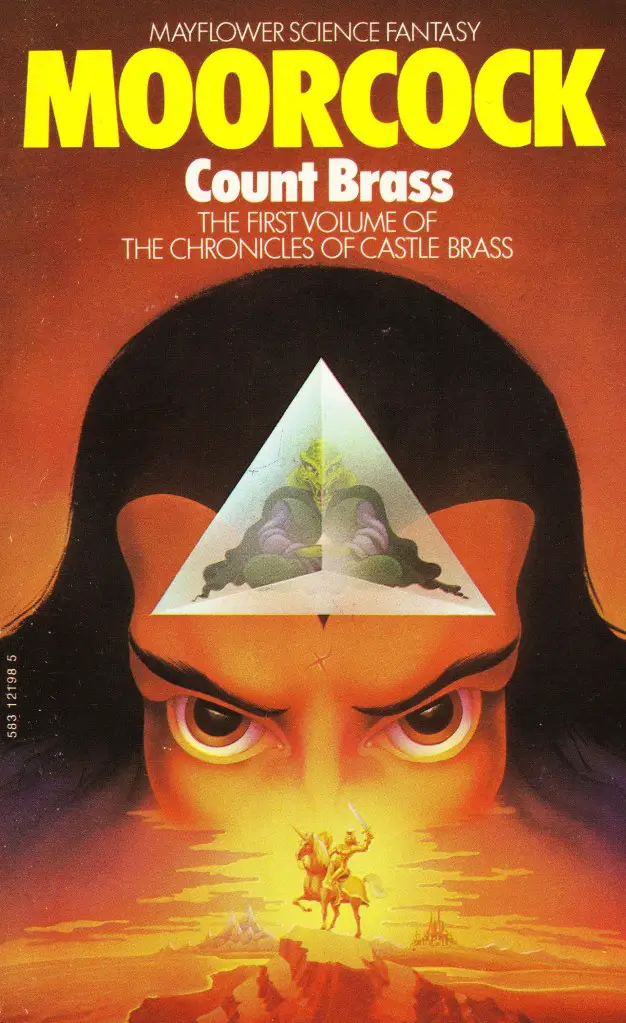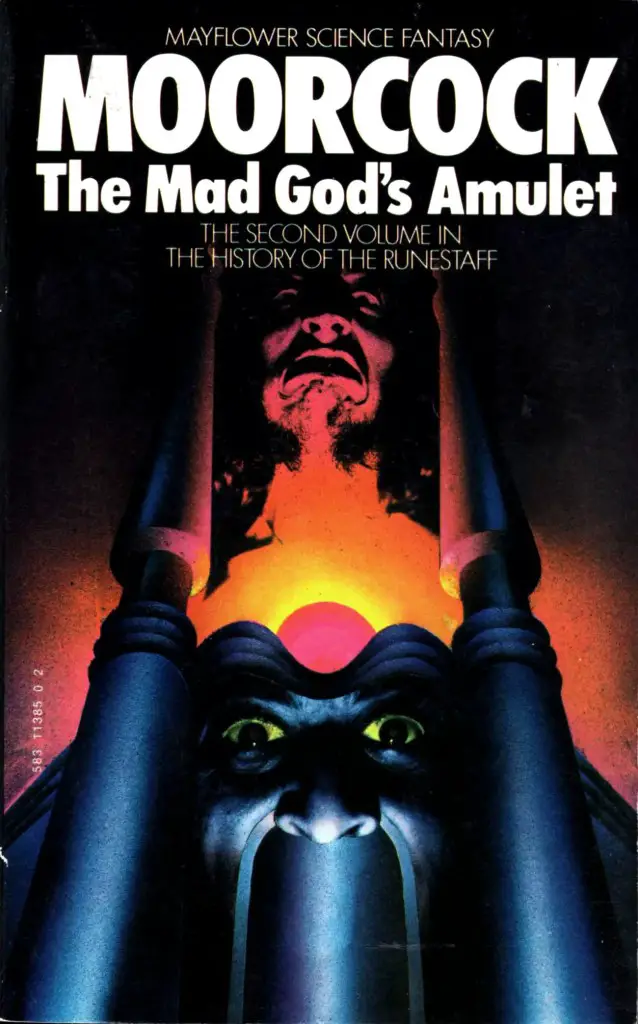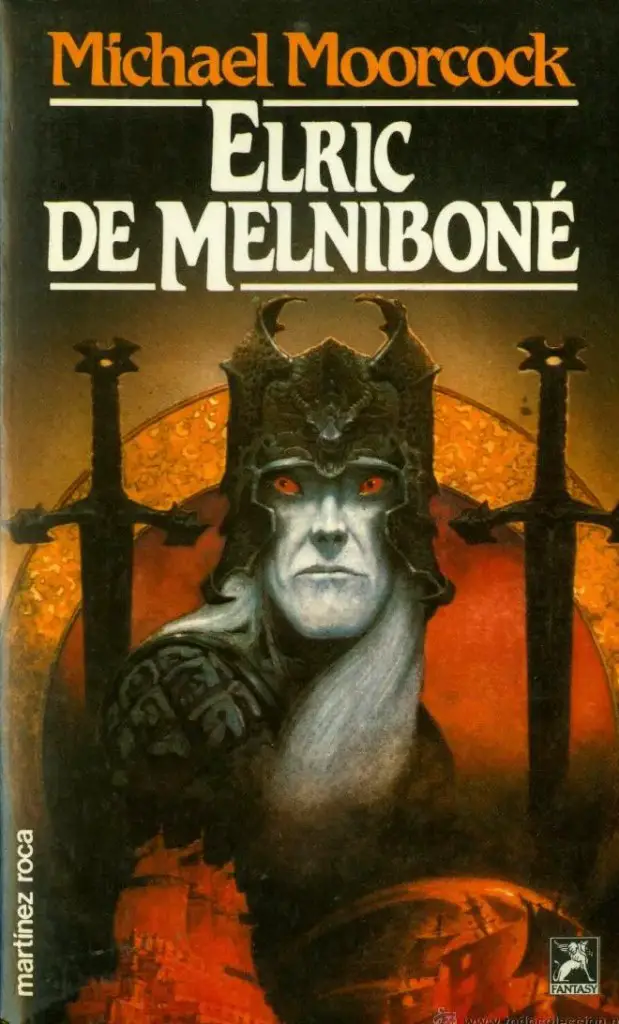Chaos deities, ancient alien meta-universes, avataric incarnations destined to perpetually reincarnate in the patrols of the eternal return, grimoires and black magic: if you are looking for the dark soul of fantasy and the fatalistic soul of the sword & sorcery, you have a good chance of finding it in the "Erlic di Melniboné »by Michael Moorcock.
di Richard Confalon
"It is a tragic story that of Melniboné, the Dragon Island. It is a story of monstrous emotions and unbridled ambitions. It is a story of spells, of betrayals and honorable ideals, of terrifying sufferings and pleasures, of bitter love and sweet hatred. This is the story of Elric of Melniboné. Much of this story Elric himself would have remembered only in his nightmares. "
Elric of Melniboné is the most famous creature of Michael Moorcock, English writer born in 1939. Unknown in Italy, Moorcock enjoys great commercial success in the United Kingdom and the United States, and has also been a source of inspiration for rock and metal bands: the album Stormbringer by Deep Purple, for example, is openly inspired by his work. In addition, authors such as George RR Martin e Andrzej Sapkowski they drew many ideas from his saga centered on the albino emperor of Melniboné Island, which we intend to talk about here.
First di Jon Snow, the white wolf was Elric, and also Rhaergar Targaryen is very reminiscent of Elric: melancholy, reflective, intellectual (the television adaptation of A Song of Ice and Fire then made him extremely similar aesthetically to the character of Moorcock). Not to mention Geralt of Rivia, The Witcher, the famous character of Sapkwoski, made even more famous by the videogame saga and the even more recent “Netflix” TV series, a pale, less profound imitation of the Elric saga.
But who was Elric? How to catalog the cycle of stories that sees him as the protagonist? To begin with, we can safely make it fall within the vein of "Sword & Sorcery", to be clear that of Conan the Barbarian di Robert ervin howard. The character of Moorcock, however, is diametrically opposed to the Cimmerian barbarian of the American author. Elric is not a muscular warrior tempered by a nomadic life, but the last emperor of a non-human race, a race that for ten thousand years reigned undisputed a world prior to ours, the Melniboneani, very refined warriors and sorcerers, worshipers of deity of Chaos: Arioch, one of the most powerful Lords of Chaos, was their protector.
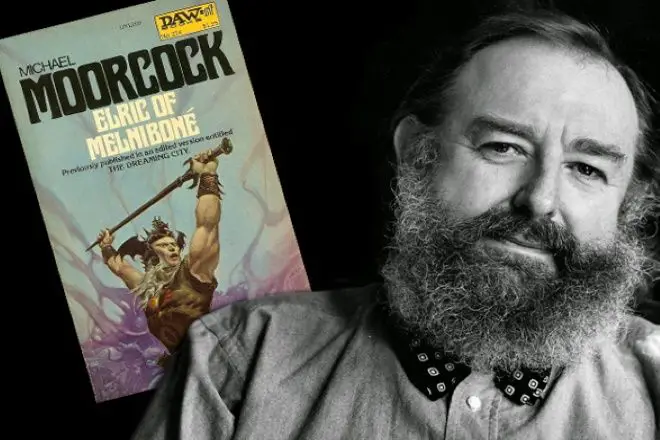
Elric was born albino and weak, and could only live on drugs that supported him. Since he was a child he was at home in his father's library: the study of ancient forgotten grimoires by his own people would eventually make him the most powerful sorcerer of his day. Unlike the other Melniboneians, however, he seemed to have human feelings, being gifted with empathy. His race was decadent, half of the population living in some kind of drug-induced sleep. A sterile hedonism had taken possession of the Melniboneeans: they were no longer those noble and powerful lords of the past and Elric was aware of this, and did not even dream of bringing them back to their former glory.
Mashed potatoes, if you are looking for a fantasy "Tolkienian”, Moorcock's work is as far away as there can be: Elric is tormented from first to last page, not because he carries a burden (like Frodo), but because he is an outcast, a misfit, has a physical diversity that makes him feel inadequate. He cannot conceive of the cruel customs of his race, he asks himself existential questions that are completely alien to his fellow men. As he sits on his ruby throne at a party, he focuses on a chorus of castrated slaves, stating:
“Why must their suffering produce such prodigious beauty? She wonders. Or maybe all beauty is created through suffering? Is this the secret of the great art, human and Melniboneana? "
Elric, unlike Aragorn, commits heinous crimes and does not fight for the Good. The moral and moralistic concept of good and evil in the work of Moorcok latita: to reach his goals the ruler of Melniboné comes to stipulate pacts with the deities of Chaos, Arioc. The latter, after centuries of absence, returns to the dimensional plane of Melniboné because evoked by the albino: from this moment and for most of the cycle Elric's motto will be "blood and souls for my lord Arioch". Even the heroic actions he commits find their main cause in revenge or alternatively in the thrust of fate, which sustains him from universe to universe, from one dimensional plane to another. Elric is a Eternal Champion, an archetype present in the meta-universe created by Moorcock: Elric, Corum, Erekose, UlrikSkarsol are the same entity, forced to relive in different planes of existence, in different universes.
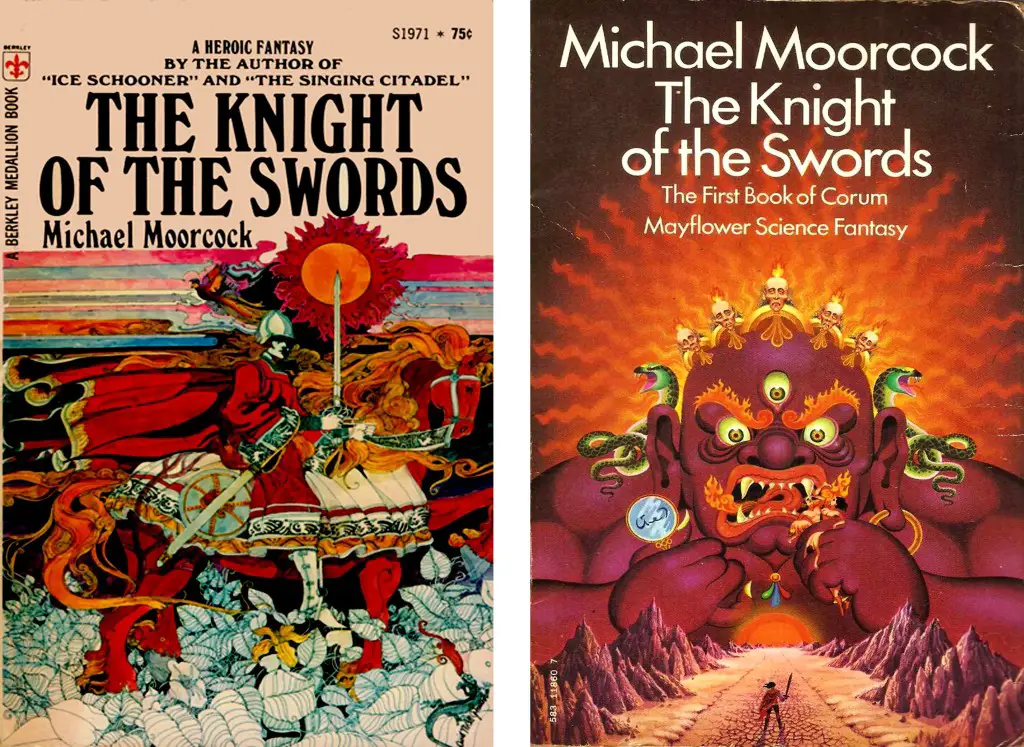
“Stormy”, the eternal return, Chaos and the Law
As previously stated, Elric was born with a congenital weakness, a weakness that would lead to his death were it not for the help of drugs / magical potions, but after summoning Arioch, he is put on the trail of a demonic sword of immense power. , a sentient sword capable of killing even gods, forged millennia first by its own people, then hidden because cursed and feared. "Stormy"(In the English version Stormbringer), this is the name of the sword, could only be challenged by the legitimate heir of the throne of Melniboné, who had the power to drink the souls of those who killed. Thus giving strength to Elric, a strength that became immense if he found himself drinking more souls on the battlefield.
Elric's relationship with Tempestosa was symbiotic, neither could be without the other: the sword claimed souls and seemed to have a certain taste for those in Elric's heart, sooner or later he drank the souls of friends and loves. The killer of women was in fact called "The albino prince", as well as "The white wolf". In addition to trying to escape his own fate, in the first part of the saga, Elric is driven by one thirst for knowledge, seeks a meaning of life, of its existence: it then sets out in search of an ancient book, a mythical text called "the book of the Dead Gods", a grimoire that is believed to contain all the knowledge of the universe, and in which the protagonist hopes to finally find answers to his questions.
“I want to know one thing […] Can there be a supreme god… or not? Here's what I need to know, Shaarilla, if my life is to have a purpose. Now the lords of Law and Chaos rule our lives. But is there a being greater than them? "
As soon as Elric manages to find this book, once touched, it pulverizes under his hands and eyes, becoming a pile of yellowish dust: this shows that there is no Holy Grail in history, the answer must be found within the individual, as long as you want to find it. With time and through encounters with his alter egos from other universes, Elric begins to sense that he too is part of a "Eternal return", is destined to incarnate continuously: he is the eternal champion, chosen by Chaos and the Law and understands that for his soul there will never be peace, that he will always be destined to fight against or on behalf of cosmic forces greater than himself . He is a being born weak, but with one will to power which prompts him to perform epic feats.
Fate in Moorcock's work it is quite important and recalls the conception that the ancient Greeks had of it, while the eternal return does not belong only to the figure of Elric and the eternal champion. Not only the Melnibonena civilization has come to an end, paraphrasing Oswald spengler, but also the world in which the saga is set has come to the end of a cycle: Elric will have the task of giving birth to a new world thus bringing the balance into perfect balance between Law and Chaos, or at least that it is not exaggeratedly biased towards either side.
However, there does not seem to be a golden age in the world created by Moorcock: a serene era is briefly described for the Melniboneeans, which ended as they came into contact with Arioch and Chaos, when they traded this serenity for knowledge and power. The final battle is clearly inspiring Norse, A kind of Ragnarok: the deities of Chaos will face those of the Law. The world before the battle is devastated at an environmental and elemental level by an almost omnipresent presence of Chaos, there is also a hellish ship very similar to the naglfar Norse. Moorcock was not too original in this, as a writer he defined himself as mediocre, but he showed that he knew certain topics of mythology and was able to adapt them well to his work.
Let's open a small parenthesis: the Chaos magic, this form of magic was born in the 70s, whose inspiring father was Austin Osman Spare, and the symbol most adopted by the chaots was "created" by Moorcock. The symbol of Chaos in Elric's tales is the eight-pointed star, or octagon of Chaos: it evokes the movement that can be made in any direction, it is a complex geometric figure, while the triangle is the symbol of the Law, the simplest figure.
Moorcock, "the anti-Tolkien"
Gandalf and Aragorn are two noble characters, moved by pure feelings. Elric is not bad by nature, as I said earlier he is also more empathic and compassionate than the rest of the Melniboneeans, but he is a servant of Chaos like all his people, he has no qualms about calling Arioch, he has no qualms about serving himself of magic by summoning powerful air elementals to defeat an enemy, over time we see him become more cynical, more resentful towards man, in a moment of desperation comes to say:
“Well, so be it: and men must tremble and flee, when they hear the names of Elric of Melniboné and his Storm sword. The two of us are alike: products of an era that has abandoned us. Let's give this era a reason to hate us. "
Elric is an outcast, an outcast, it is not acclaimed by the people, indeed people are terrified of it, they always look at the White Wolf with fear. Aragorn wanted to become a king, Elric hates the ruby throne which belongs to him by right of him. Aragorn returns to his kingdom, Elric destroys it; Gandalf's magic is luminous, Elric's is dark, demonic, chaotic. In Moorcock's work it is clear from the first page that there will be no happy ending: the Eternal Champion always has the same tragic destiny, he can't be calm even when he finally finds a love he hasn't felt for years:
"Beware of me. I have to fulfill my destiny. "
"Your destiny?"
“It's not a real destiny, but something scary, a curse. And I have no mercy, except when I look into my soul, and that's part of the curse that drags me along. Not fate, not stars, not men, not demons, not gods. Look at me, Zarozinia: I am Elric, the miserable plaything of the gods of time ... Elric of Melniboné, who causes his own gradual and terrible annihilation. "
"It's a suicide!"
"Yup. I proceed towards a slow death. And those who are beside me suffer with me. "
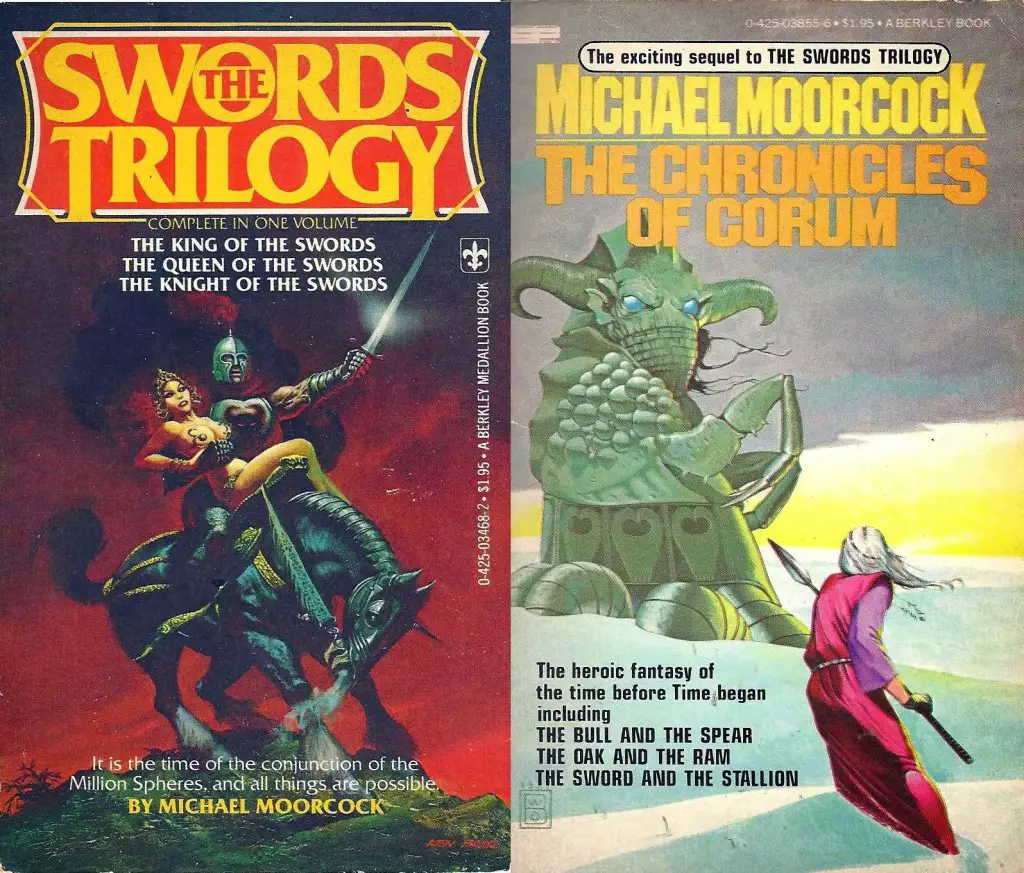
Tolkien rocks, Moorcock slaps. We have all felt like Elric at least once in our lives: how many have felt like Aragorn or Gandalf? Aragorn's sword is the noble Narsil, while Elric's Tempestosa is unholy, evil, greedy for blood and souls. Sex is completely absent in Tolkien, but Elric often indulges in the pleasures of the flesh, it is desired by women, and he desires them. He has only one friend, Maldiluna, because every Eternal Champion of Moorcock has a loyal sidekick. With Maldiluna, perhaps, he has found the most serene relationship he has in his entire existence.
Moorcock even went so far as to define The Lord of the Rings "a Winnie the Pooh in epic version, ”but not only the Oxford professor was the subject of criticism, too CS Lewis it is treated in the same way as JRR Tolkien. Elric is a complex character, a product difficult to sell to children in a fairytale key: Moorcock represents, one could sentence, the dark soul of fantasy. Perhaps one thing Tolkien's heroes have in common with Elric: a "providential" factor. Tolkien, as a Catholic, obviously has a high regard for the role of providence: Aragorn, Gandalf, Frodo and others are providential. In a certain sense, Elric is also providential: its role is to restore balance, even if in the course of the saga its providential role seems like a curse to be served forever. The concept of time is also different between the two authors: Tolkien has a linear and non-cyclical concept of time as Moorcock understands it.
NDespite Moorcock's success, no film, animation, or television series transpositions of his work have yet been made. Several comics have been made, however, on the Elric saga, including one by Neil Gaiman. If what you have read intrigued you, Mondadori published the volume in September 2019 Elric the Saga, which includes all the stories of the last emperor of Melniboné.
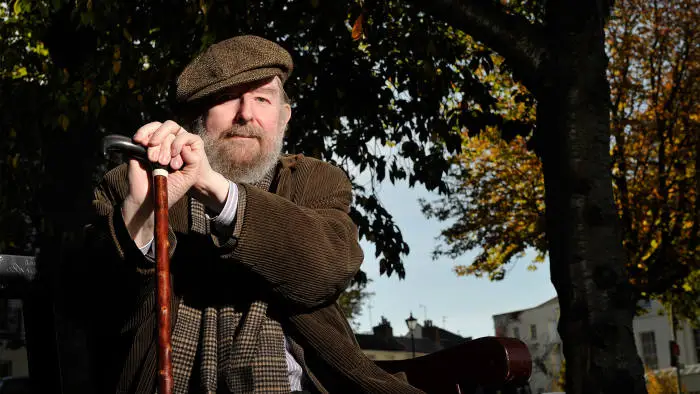
Note:
[1] In Norse mythology, the final battle between the powers of light and order and those of darkness and chaos, as a result of which the entire world will be destroyed and thus regenerated.
[2] The ship made from the nails of the dead, leading the giants to attack on the day of Ragnarok. Loki takes the helm.
[3] Chaos magic is a form of ritual magic whose theories were first formulated in West Yorkshire in England around the 70s. Practitioners of such magic believe they can change reality by using different techniques, meditation, breathing, creating magical seals, and more. We can consider the magic of chaos strongly individualistic, therefore there are no rituals common to all practitioners. One of the fundamental texts is Liber Null & Psychonaut by Peter J. Carrol, the psychonaut culture is quite influential among the chaotic, authors like Terence McKenna and Robert Anton Wilson are quite influential.

